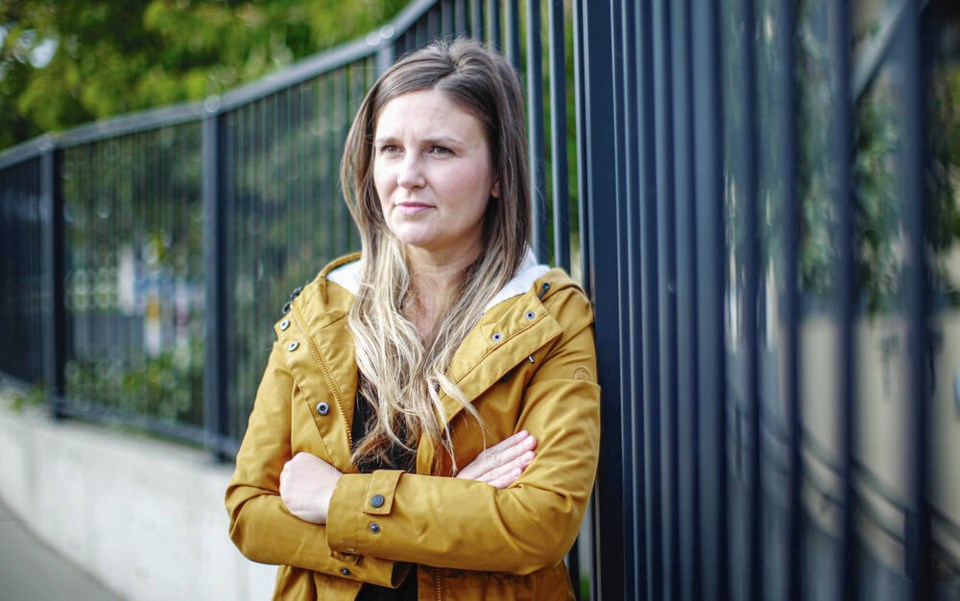When accountant Erin Booth felt faint and disoriented while shopping alone in a Sidney grocery store, she called 911 for help and was put on hold for an ambulance. She waited so long that eventually she took a cab to the hospital.
“I was absolutely shocked,” said Booth. “No one plans on calling 911 so it’s so important people realize having a backup plan might be very important right now while ambulance staffing shortages are worked out.”
Booth, of Saanichton, was in an aisle at Save-on-Foods when she felt a sudden intense pressure in her head, her hearing became muffled, and “I thought I was going to just fall over,” she said. She had reason to believe it could be a blood clot.
It was 7:01 p.m. Sunday. Booth called E-Comm 911. The call taker asked: “Police, fire, ambulance?” Booth replied: “Ambulance” and was told there would be a really long wait and was she sure she wanted one. The call taker was seemingly unable to hazard an estimate when it would arrive. “I was thinking a long wait was going to be five minutes,” Booth said.
Fifteen minutes later, Save-on-Foods employees assisted Booth in ordering a cab. It would be 105 minutes before she’d hear from the ambulance service.
“It was 7:30 when I finally hung up the call because I had gotten to Saanich Peninsula Hospital and I was still on hold,” Booth said.
“It was at 8:45 p.m. when I was being prepped for a CT scan, getting the IV in my arm, and that’s when B.C. Ambulance called me back to see if I still needed an ambulance,” she said.
E-Comm 911 tweeted on Sunday that similar to the previous day, “we are continuing to see some waits on 911 as our call takers transfer 911 calls to ambulance. We are anticipating another busy night ahead and we are asking the public to #HelpUsHelp, keep 911 lines free for emergencies only.”
Booth, who has two children, ages nine and 11, said it’s ingrained in Canadians if there’s an emergency to call 911.
If another emergency were to happen, Booth said she’d use the service again, but this time “I’ll be thinking of how am I going to get to the hospital or how else am I going to get the help I need.
“This wasn’t a one-off or bad luck, or the call got dropped. When I called, the guy said: ‘You know this is going to be a long wait, right?’ so I wasn’t the only one experiencing long waits to get connected to an ambulance.”
“All you get is this unhelpful recording saying ‘we have heavy call volumes please stay on the line,’ ” Booth said of her experience while on hold wtih 911.
As is their policy, the 911 call taker told Booth they would stay on the line until the ambulance service engaged.
But when she ordered a cab she said she repeatedly tried to get the call taker’s attention and no one answered. Something with the service is very wrong and it goes beyond the obvious staffing shortage, Booth said.
The Times Colonist has recounted several stories in which Islanders were put on hold with 911 while waiting to be connected to the ambulance service.
On Aug. 25, Stephanie Weir raced to the ambulance station two blocks from her Qualicum Beach home to get help for ailing post-operative husband after she was put on hold. The attendant turned her away because the only ambulance was out on a call. It would be 30 minutes before an ambulance from nearby Parksville appeared.
Two days later, Parksville resident Harry Charles Blakey, 72, a retired Mountie and lawyer, died on his kitchen floor about 15 minutes into a 30-minute wait for an ambulance after his family called 911. Blakey’s grown children and daughter-in-law called on the government to improve ambulance response times.
On Aug. 28 Eileen Bell, diagnosed with an irregular heartbeat, awoke to a racing heart, a squeezing feeling in her chest and an aching jaw. Bell called 911 from her home in Saanich. Her stress was exacerbated by the delay in getting through to the ambulance service. Instead, her husband drove her to Saanich Peninsula. After tests, they arrived home to a message from B.C. Emergency Health Services left 45 minutes after they originally called to ask if help was still needed.
On the same day, Nigel Habgood, 72, had fallen asleep watching TV when he heard his wife, Carole Kowal, screaming. Kowal, suffering complications from terminal liver disease, was lying in a pool of blood on the bathroom floor of their Qualicum Beach home.
He called 911, asked for an ambulance, but after 20 minutes on hold packed his wife into his car and drove to the ambulance station, where paramedics took her to Nanaimo Regional General Hospital.
Booth wonders if she had asked for the fire department if she could have got faster assistance or at least a faster connection to the ambulance service.
Compounding the seriousness of the wait, she said, is that E-Comm call takers with no medical expertise answer the call, but don’t ask details or triage the emergency and can’t give patients or bystanders medical instruction while waiting. “I don’t think it’s a great model,” she said.



